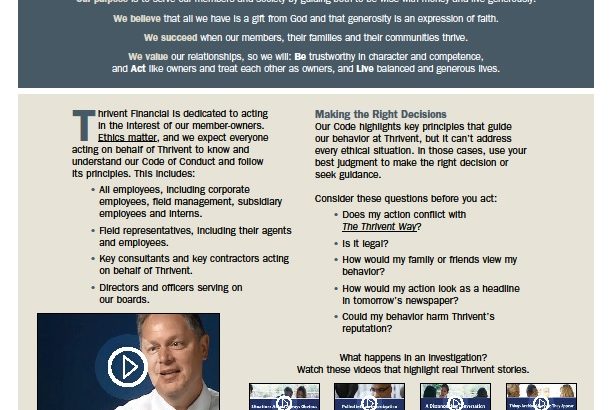EEOC vs Thrivent Gary Messier case, Thrivent disclosed Messier’s medical condition of severe migraine headaches to prospective employers, Core Christian values exercised?, You decide
From EEOC vs Thrivent Financial, US District Court of Appeals, Seventh Circuit.
“STATEMENT OF JURISDICTION
This is an appeal from a final judgment entered by the district court. The Equal Employment Opportunity Commission (“EEOC” or “Commission”) brought this action, alleging that Thrivent Financial for Lutherans (“Thrivent”) violated the confidentiality provision of the Americans with Disabilities Act (ADA), 42 U.S.C. §
12112(d)(4)(C), when it disclosed a former employee’s medical condition to his prospective employers. R.1, Complaint at 1. The district court’s jurisdiction was based on 42 U.S.C. § 12117(a) and 28 U.S.C. § 1331. The EEOC and Thrivent filed cross-motions for summary judgment in the district court. R.11 & 14. On June 15, 2011, the district court granted Thrivent’s motion for summary judgment, denied the EEOC’s partial motion for summary judgment, and dismissed the case. R.25 & 26. The EEOC
filed a timely notice of appeal on August 11, 2011. R.27.
STATEMENT OF THE ISSUES
1. Whether the district court applied incorrect legal standards to the EEOC’s argument that Thrivent made a job performance-related inquiry when it ruled that the ADA’s confidentiality provision does not apply to job performance-related inquiries and that such inquiries must be “likely to elicit information regarding a disability.”
2. Whether the district court committed legal error when it decided that the former employee’s medical response was voluntary and not entitled to confidentiality.
3. Whether, as a matter of public policy, the district court improperly determined that Thrivent was not required to hold confidential its former employee’s medical information.
STATEMENT OF THE CASE
A. Course of Proceedings
On September 30, 2010, the EEOC filed this action under the ADA, 42 U.S.C. § 12101 et seq., seeking relief for charging party Gary Messier. In its complaint, the Commission alleged that Thrivent disclosed Messier’s medical condition of severe migraine headaches to prospective employers in violation of the ADA’s confidentiality
provisions. R.1, Complaint at 1, 3. At the request of the district court, the parties filed cross-motions for summary judgment under the district court’s “Fast Track Summary Judgment Procedure.” R.10, Rule 16 Telephone Scheduling Conference at 2.
On March 1, 2011, Thrivent filed its summary judgment motion and brief, arguing that it was entitled to summary judgment on the EEOC’s ADA claim because Messier’s voluntary disclosure was not a response to a “medical inquiry,” R.13 at 5-9.
Thrivent further argued that because Messier voluntarily disclosed his medical condition, Thrivent’s subsequent disclosure of Messier’s medical information did not violate the confidentiality provision. Id. at 10-15.
That same day, the EEOC filed a motion and brief for partial summary judgment, primarily arguing that it should prevail on summary judgment because Thrivent should have kept confidential Messier’s medical information because it was obtained pursuant to Thrivent’s job performance-related inquiry. R.15 at 4-7. The
Commission also argued that Messier’s disclosure was not voluntary but rather “in response to the inquiry by Thrivent and its agent into the reason for his absence,” id. at 7, and therefore it was protected by the confidentiality provisions. The Commission reiterated these arguments in its opposition to Thrivent’s motion for summary
judgment.
On June 15, 2011, the district court decided that Thrivent’s disclosure did not violate the ADA because Messier had not provided his medical information in response to a medical inquiry, and because Messier‘s medical disclosure was voluntary. R.25, Opinion (“Op.”) at 6-10. Accordingly, the district court entered
judgment granting Thrivent’s summary judgment motion and denying the EEOC’s partial summary judgment motion. R.26. The EEOC appealed. R.27.
B. Statement of the Facts
Thrivent Financial for Lutherans is a faith-based, not-for-profit financial services membership organization that manages $67 billion in assets and sells life insurance and other financial products and services. In July 2006, Omni Resources, Inc. (“Omni”), a
technology consulting agency, hired Messier to work as a temporary SAS programmer for Thrivent pursuant to a consulting services agreement between Thrivent and Omni.
R.25, Op. at 1-2. Thomas Brey was Messier’s account manager at Omni, and John Schreiner was the manager of the Thrivent department to which Messier was assigned. Id. at 2.
On November 1, 2006, Messier did not report to work at Thrivent, and he did not inform anyone that he would not be at work. R.25, Op. at 2. When Schreiner noticed that Messier had not reported to work, Schreiner called Brey at Omni looking for Messier. Brey then sent Messier the following email:
Gary,
Give us a call, and give John a call. We need to know what’s going on. John called here looking for
you.
Id. at 2. At 4:53 p.m., Messier sent Brey an email response, on which he copied Schriener, that said:
Tom/John
I’ve been in bed all day with a severe migraine. Have not had one this severe in over six years.
Three doses of Imitrex today and I am finally able to function. Sorry for the very late reply but when I get migraines of this severity I am bed ridden until I can get them to a level so I can function. People have many medical conditions that are not obvious on the surface. They struggle with them every-day and try to get thru life one day at a time. I’ve had these migraines since a major car accident in 1984. Because this was a head on at 50 miles an hour I am very lucky to
have lived thru it. But these migraines are an end result of the head trauma that I experienced that day. I have been waiting for the medical field to come up with a solution ever since. I am attending
a few sessions, this coming Saturday, in a seminar sponsored by Theda-Care on Brain & Spine conditions. Hopefully this may provide the information that I have been searching for to help
alleviate this situation. The medical field has come a long way since 1984. I am currently reaping some of the benefits to help control this problem with the medication regiment [sic] that I am
currently on. At least I am functional most days but when I have one of the severity I had today do not expect any response from me or even a phone call as the pain level is so severe that it puts most
people in the hospital. I have been dealing with this pain for a long time and I have found the best way to deal with it is to let it run its course. Probably a lot more than either of you wanted to know
but I want to be totally honest with both of you. If all goes well I will be in tomorrow on schedule. I hope this answers your concerns and that I am fully committed to Thrivent and Omni thru the
remainder of my contract.
Gary
Id. at 2-3. Later that evening, Brey e-mailed Messier, saying:
Gary,
Get better. That is the most important thing. John called out of concern for your well being because you are very good about notifying us when you are going to be out.
Get better and we can go from there. If there is anything that I or Omni can do please let me know. We are here for you.
Tom Brey
Account Manager
R.12-1, Ex. A at 4; see also R.25, Op. at 3.
On December 4, 2006, Messier quit working at Thrivent, R.25, Op. at 3.
Thereafter, he began to seek employment. Id.; R.12, Stipulated Findings of Fact (“Stipulated Facts”) at 3. Because three prospective employers lost interest after they conducted reference checks, Messier suspected that Thrivent, which he had listed as a
reference, was giving him a negative reference and disclosing his medical condition. Id.
Based on these suspicions, Messier hired Reference Matters, Inc., an online reference-checking agency. Id.
On or about January 10, 2008, a Reference Matters representative called Schreiner at Thrivent and Schreiner disclosed information about Messier’s migraine condition to this representative. Id. Specifically, in response to the checker’s questionnaire, Schriener provided the following pertinent information:
• “We [Messier and Thrivent] ran into a very strong disagreement on expectations and he walked out on us.”
• When asked how he would rate Messier’s attendance, Schriener
selected the box for “below average.”
• When asked “[w]as this individual always on time?,” Schriener
again selected the “below average” box.
• When asked “[w]ere you satisfied with his work performance?”
Schriener said: “No, that was part of the reason he left. It was due to our expectations on what he should produce.”
• Significantly, Schriener added: “He has strong technical skills.
From that standpoint, there were no issues. It was his ability to get the work done. He has medical conditions where he gets migraines. I had no issue with that. But he would not call us. It was the letting us know.”
R.12-2 at 2 (emphasis added).
In September 2010, the EEOC filed this ADA action, alleging that Thrivent violated the confidentiality provisions of the ADA when it disclosed Messier’s medical information to prospective employers, causing “a severe and negative impact on his ability to obtain employment from those employers.” R.1, Complaint at 1. On March 1, 2011, Thrivent and the EEOC filed stipulated findings of fact. R.12, Stipulated Facts.
That same day, the parties also filed cross-motions for summary judgment pursuant to the district court’s fast track procedures. Specifically, Thrivent filed a summary judgment motion, R.11, principally arguing that it had not breached the ADA’s confidentiality provision because it obtained Messier’s medical information as a result of a voluntary disclosure, and not pursuant to a medical inquiry. R.13, Thrivent Summary Judgment (SJ) Br. at 2. The EEOC filed a motion for partial summary judgment, R.14, primarily arguing that Messier’s medical disclosure was not voluntary because it was provided in response to Thrivent’s job performance-related inquiry into his absence. R.15, EEOC PSJ Mem. at 7. Similarly, in its opposition to Thrivent’s motion
for summary judgment, the Commission reiterated that “Messier disclosed his migraines involuntarily in response to a job-related inquiry by Thrivent, and then Thrivent violated the ADA when it revealed that information to Messier’s prospective
employers.” R.17, EEOC SJ Opp. at 2. ”
Read more:
https://www.eeoc.gov/eeoc/litigation/briefs/thrivent.txt
From Thrivent’s Code of Conduct.
“Making the Right Decisions
Although this summary document highlights the key principles that guide our behavior at Thrivent, the Code cannot address every ethical situation. In those cases, use your best judgment to make the right decision or seek guidance.
Consider these questions before you act:
• Does my action conflict with Thrivent’s core values?
• Is it legal?
• How would my family or friends view
my behavior?
• How would my action look as a headline
in tomorrow’s newspaper?
• Could my behavior harm Thrivent’s reputation?
These guidelines, along with the supporting documents found on the Code of Conduct website, will help you to always do the
right thing.”
Read more:
https://www.thrivent.com/files/24097.pdf
Has Thrivent embraced their much touted Core Christian Values in their treatment of Gary Messier?
You decide.



